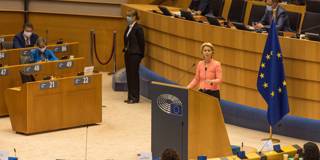Although the European Union already has a lot on its hands as it confronts a new wave of COVID-19 infections and seeks to position itself for a sustainable recovery, it must not ignore another crisis looming on the horizon. The bloc is rapidly and inexcusably falling behind China and America in the digital transition.
STOCKHOLM – EU Commission President Ursula von der Leyen offered an upbeat assessment in her first annual policy report (“state of the union” address) to the European Parliament this month. Clearly, the agreement this summer on an unprecedented €750 billion ($879 billion) recovery fund and renewal package has given the European Union a new sense of strength.
But now is not the time for complacency. While Europe can take pride in leading the world toward carbon neutrality and a “green recovery,” COVID-19 cases on the continent are spiking again, and the region remains at serious risk of falling behind in the global technology race.
In terms of the broader economy, there is now talk of a “K-shaped” recovery in which some sectors decline sharply while others boom, often by seizing on opportunities created by the crisis itself. The EU has every reason to worry that its economy comprises more sectors in the first category than in the second, which invariably centers on information and communication technology (ICT).

STOCKHOLM – EU Commission President Ursula von der Leyen offered an upbeat assessment in her first annual policy report (“state of the union” address) to the European Parliament this month. Clearly, the agreement this summer on an unprecedented €750 billion ($879 billion) recovery fund and renewal package has given the European Union a new sense of strength.
But now is not the time for complacency. While Europe can take pride in leading the world toward carbon neutrality and a “green recovery,” COVID-19 cases on the continent are spiking again, and the region remains at serious risk of falling behind in the global technology race.
In terms of the broader economy, there is now talk of a “K-shaped” recovery in which some sectors decline sharply while others boom, often by seizing on opportunities created by the crisis itself. The EU has every reason to worry that its economy comprises more sectors in the first category than in the second, which invariably centers on information and communication technology (ICT).